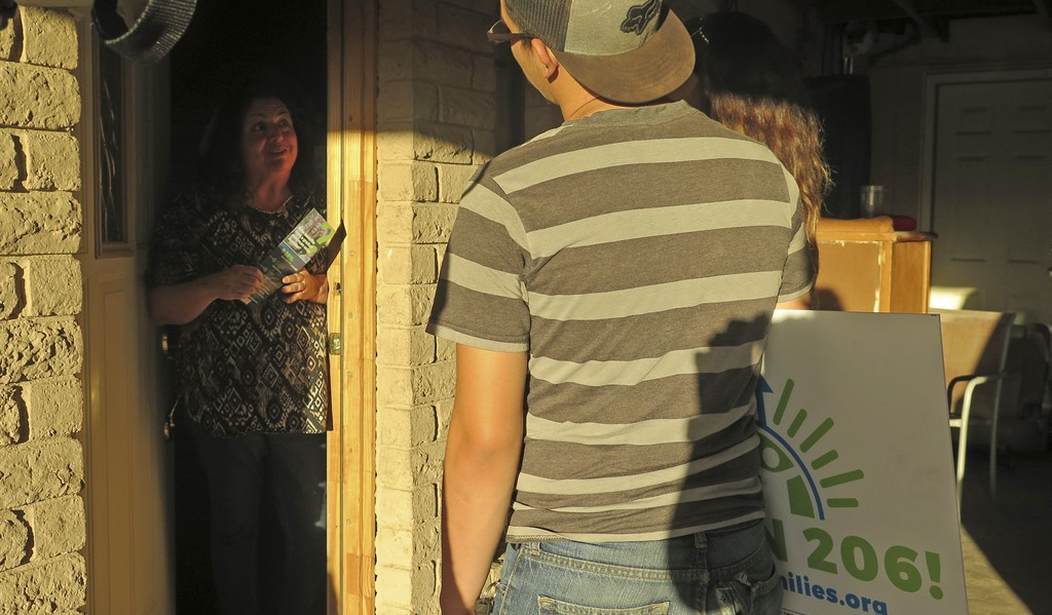One of the most amazing things about what was arguably the most surprising election in a generation was the number of Hispanic voters who seemed to choose Donald Trump. According to exit polls, Trump received a higher percentage of Hispanic votes than Mitt Romney in 2012 -- 29 percent, compared with 27 percent. How is it that the man who wants a deportation force to rid the country of undocumented immigrants bested the guy who only wanted people here illegally to self-deport? Well, hold on to your Make America Great Again hat: It turns out that the 29 percent figure is probably way off.
According to Latino Decisions, whose sample of 5,600 Latino voters is much larger than the fraction included in exit polls or even polls taken before the election, less than 20 percent of the Hispanic population voted for Trump. Why the big difference? The biggest reason is sample size and the way the sample was selected. Edison Research, the firm that conducted exit polling relied on by the media, warns that its results shouldn't be used to analyze behavior among geographically concentrated subgroups such as Hispanics and blacks. In part, this is because the smaller the sample size of a subgroup within a sample of voters the less accurate the results. But there is another bias at play, as well. If history is a guide, Edison Research skews its precinct sample to more affluent, highly educated areas. Among Edison's sample of nonwhite voters this year, for example, 44 percent had a college degree, while only 15.5 percent of Latinos nationally have a college education.
LD's results -- that only 18 percent of Hispanics voted for Trump -- are also in keeping with the results of other polling that oversampled Hispanics prior to the election. Virtually all those polls predicted that Trump would do much worse among Hispanics than Romney or any other Republican candidate had in recent years. But doing worse does not mean that Trump had no support in the Hispanic community. Hispanics are not single-issue voters -- and as I have been saying for years, they are fully assimilating into the American mainstream.
Recommended
While the media and most analysts on both the right and the left refer to Hispanics as nonwhite, most Hispanics don't identify themselves in those terms. As the Census Bureau reminds everyone when it issues racial and ethnic statistics, Hispanics may be of any race. The majority of Hispanics actually self-identify on census data as white (53 percent), while 37 percent identify not as white, black or Asian but as "some other race." Mexicans are, by and large, racially mixed. Indeed, the much-maligned term "La Raza" actually refers to the new "race" of Mexicans who were the progeny of intermarriage among Spanish settlers, indigenous groups and Africans who were brought to Mexico as slaves.
It is possible, perhaps likely, that some of those Hispanics who voted for Trump were actually attracted by his views on immigration. To the degree that American-born Hispanics feel the newly arrived Hispanic immigrants compete with them for jobs or increase prejudice toward Hispanics in general, they may well support Trump's proposal to deport immigrants here illegally. I've heard from many such voters throughout the course of the election, as well as from Hispanics who simply support whoever the Republican nominee is even if they don't agree with him on every issue. But my guess is that most Hispanics who voted for Trump were like his other supporters -- attracted by Trump's outsize personality and hopeful that he could jump-start the economy.
The question for the Republican Party going forward, however, is whether this year's presidential victory included an acceptable amount of support from one of the fastest-growing groups in the country. Whether it was 18 percent as LD's analysis shows or 29 percent as the Edison exit polls suggest, wouldn't it make sense to try to get back to the 40-plus percent support Presidents Ronald Reagan and George W. Bush enjoyed?

























Join the conversation as a VIP Member